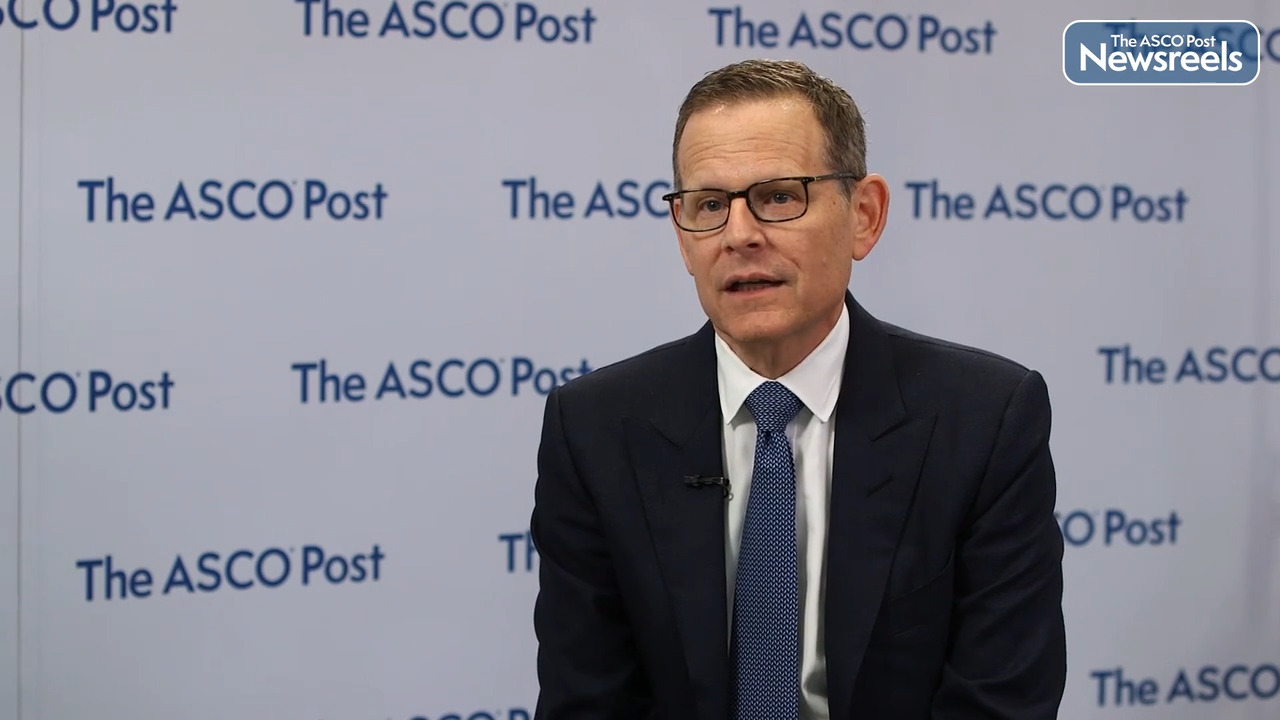Transcript
Disclaimer: This video transcript has not been proofread or edited and may contain errors.
Tycel J. Phillips:
I think we're all very excited to see your presentation about this phenomenal treatment in Hodgkin's lymphoma. If you can, in your own words, just give us a little background about what led to the development of this clinical trial.
Alex F. Herrera:
Absolutely. S1826 was a trial that we started developing several years ago. Back then, the standard treatment for advanced stage Hodgkin's lymphoma was PET-adapted combination chemotherapy, but different regimens were given across the globe. Pediatric patients and adult patients received different regimens. Pediatric patients, actually a majority of them with advanced stage disease, received radiation, consolidative radiation. So the landscape was really varied, and right around that time, brentuximab vedotin became an option in the front-line treatment of advanced stage Hodgkin's lymphoma after ECHELON-1 showed that modified progression-free survival, and ultimately overall survival, was better compared with ABVD.
And so that was kind of the landscape when we were developing the trial. We designed S1826 to really be this direct comparison, randomize patients on a 1:1 basis comparing brentuximab vedotin, AVD, which was a standard at that point, compared to PD-1 blockade combined with AVD, so with nivolumab.
Tycel J. Phillips:
Again, a very bold step, because we talk about all these effective treatments and nobody really ever goes head-to-head and you took on the lion. What about the results? Tell us how this study played out.
Well, I would say I appreciate you saying it was a bold step. I think this is exactly the kind of research that we can do in the cooperative groups. This was a huge collaboration across the adult and pediatric cooperative groups to design this study, develop consensus for this study, and make that bold step. In the end, we were rewarded because at a second planned interim analysis, actually, the primary progression-free survival endpoint crossed into the protocol-specified statistical boundary and nivolumab AVD resulted in superior progression-free survival compared to brentuximab AVD. The hazard ratio was 0.48, so it was a dramatic improvement in outcomes.
I think you hit the key, dramatic, because obviously a lot of us knew about the study. I don't think any of us expected it to read out this early. How shocked are you about the results and what's next for the field?
Alex F. Herrera:
Yeah, it was a really dramatic result. One, because it happened so soon, but also because brentuximab vedotin is a really good drug for Hodgkin's lymphoma. And so to see such a large effect was a little surprising. But we also know that PD-1 blockade is a phenomenal drug for the treatment of Hodgkin's lymphoma, and it takes advantage of this genetic vulnerability. Hodgkin's lymphoma has these genetic changes in the PD-1 ligand genes that lead to overexpression of PD-1 ligands on its surface, so it's really a truly targeted therapy. But also, it doesn't have a chemotherapy component. So not only are we improving outcomes, but we're also reducing toxicity. Only 6 out of almost 1,000 patients received radiation. For me, obviously it's exciting that the study was a positive study and the outcomes were improved, but even just the reduction of radiation for such a young population is a win in and of itself.
Tycel J. Phillips:
I think that last point is a big point. I think we've all argued quite a bit with the role of radiation in patients with Hodgkin's lymphoma and the late complications, and especially given the differences, as you mentioned, between adults and pediatrics. Again, phenomenal. Moving forward with what we have and what we know from this, how do you see treatment evolving in Hodgkin's patients?
Alex F. Herrera:
It's a great question. I think we're going to continue to follow these patients and there's a regulatory submission that BMS is working on, so you can envision nivolumab AVD becoming the front-line treatment option for advanced Hodgkin's lymphoma. I think the next questions are, actually, there are still several questions. I don't think we could just claim victory and stop here. Brentuximab vedotin is a good drug for Hodgkin's lymphoma. Can we reincorporate it back into front-line therapy? Or is the role in second line? Are the outcomes good enough that we can start to think about deescalation based on biomarkers? I think there's some really exciting questions to ask still.
Tycel J. Phillips:
Yeah, I think those last two points are very, very interesting and I think we're all quite interested in seeing how this plays out moving forward. I think, for you, this is, again, a great and phenomenal study. Again, I applaud you and thank you for taking time to be with us this afternoon.
Alex F. Herrera:
Oh, thank you. My pleasure. Honestly, I am, in some ways, just the messenger. This was a huge effort from many, many, many people across the NCTN, but it's exciting, and most of all, exciting for patients, so thank you for taking the time.
Tycel J. Phillips:
No, I appreciate it. Thank you.




